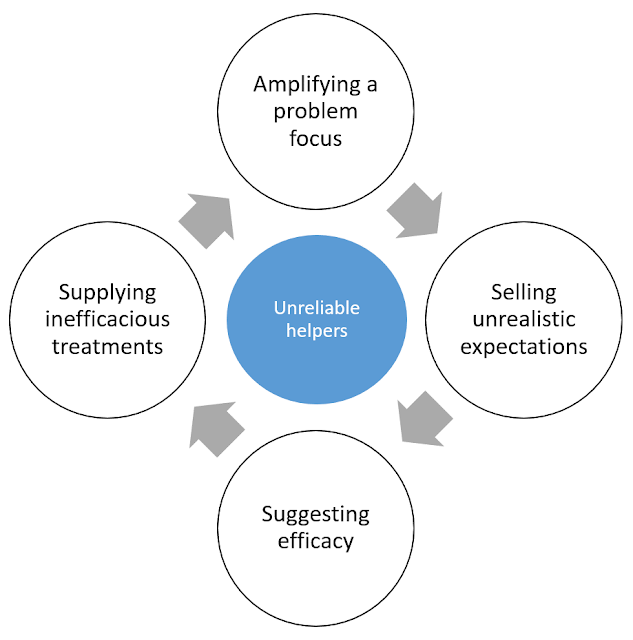Four things unreliable helpers do
Can we always trust professional helpers? Unfortunately we cannot. Suppliers of help can even harm us when they tell persuasive stories and supply us their treatments. They might do this with the best of intentions and they may actually believe in their treatments. But there may also be cynical and unreliable suppliers who knowingly sell us ineffective and even harmful treatments. Let's look at how people of the latter category, these unreliable helpers, might work. I think, in essence, they do four things.
On a side note: searching for happiness can be bad for us. It can make us unhappier and more lonely.
1. Amplifying a problem focus
First, these people can do some things which implant in us the feeling that we need help. There are roughly two ways of doing that. The first way is to focus our attention on symptoms and problem causes. For example, a coach might ask lots of questions about what goes wrong in our life, in what ways we notice this, and what all of these things say about us and our life. This process is sometimes called problem induction. By focusing our attention on these sorts of things we can soon begin to think that there something seriously wrong in our life and that we need help.2. Selling unrealistic expectations
The second way to make us feel we need help is to sell us certain idealistic expectations. For example, if someone persuades us of the idea that focus on attaining and experiencing happiness in our life we can become more conscious of how happy we now are and that idealistic goal. We can start to feel that something which is achievable and important in our life is missing and we may become more receptive for help. The more idealistic the expectation is which someone sells us, the 'better' because the more likely we will think we need help.3. Suggesting efficacy
Once we have become receptive to the idea that we need help, phase two kicks in which is about the treatment which should be helpful. The first thing these unreliable helpers will do is to suggest that this treatment is efficacious. For example, if they have first made us believe that we should be happier than we currently are they can offer us a service or product (therapy, coaching, training, pills, etc.) which promises us to make us happier.On a side note: searching for happiness can be bad for us. It can make us unhappier and more lonely.

Comments